

Jameson announces ‘Penn Forward’ strategic framework
Six months into his term as the official head of the University, Penn President Larry Jameson announced a new campuswide strategic framework to shape the school’s future.
The plan — titled “Penn Forward” — marks Jameson’s first major institutional effort as Penn’s 10th president and comes amid mounting external pressures and intensifying questions about the value of higher education. It seeks to address both the “challenges and opportunities” facing higher
education, according to a Wednesday announcement from Jameson, Provost John Jackson Jr., and Executive Vice President Mark Dingfield.
“Now, higher education faces new challenges and opportunities,” the senior administrators wrote in the announcement. “These include a rapidly shifting funding environment, virtual learning, artificial intelligence, new research tools, rising skepticism about higher education’s value, and the potential to serve more learners
Judge grants Penn’s motion to dismiss Amy Wax’s discrimination lawsuit
The decision responded to Wax’s claims that Penn’s sanctions unfairly discriminate against her as a ‘White Jewish woman’
FINN RYAN
Senior Reporter
A federal judge has dismissed the lawsuit brought by University of Pennsylvania Carey Law School professor Amy Wax against Penn as part of her longstanding battle contending that the University’s speech code violates civil rights law.
across more stages of life and more parts of the world.”
In an exclusive interview with The Daily Pennsylvanian, Jameson said that the decision to implement a new strategic framework for the University came as a “sigh of relief” to key stakeholders, indicating that Penn is “aggressively grabbing the reins to study what’s going on in higher education.” He highlighted key concerns for the University, including supporting research
efforts and building partnerships with the private sector.
The initiative builds on the key pillars of the “In Principle and Practice” framework developed by former Penn President Liz Magill in 2023. The team behind “Penn Forward” designed the program using feedback from students, faculty, and alumni who expressed interest in refreshing Penn’s strategic planning, Jameson said.
See JAMESON, page 3
After previous dip, 2025 Wharton donor list rebounds as prominent names stay of
Each year, The Wharton Fund releases its Donor Honor Roll, which is primarily composed of a list of donor names and their affliation to Penn
TANISHA AGRAWAL Staff Reporter
“As much as Wax would like otherwise, this case is not a First Amendment case. It is a discrimination case brought under federal antidiscrimination laws,” Savage wrote. “It calls for us to determine whether offensive comments directed at racial minorities are protected by those laws.”
Savage added that the “anti-discrimination statues” cited by Wax “protect speakers, not speech.”
“Upon a closer look, her claim that Penn
The decision — filed Aug. 27 in the United States District Court for the Eastern District of Pennsylvania — responded to Wax’s claims that Penn’s sanctions unfairly discriminate against her as a “White Jewish woman.” The Wednesday opinion, authored by senior U.S. district judge Timothy Savage, concluded that “Wax does not allege facts showing that she was discriminated against” and closes the door to further proceedings in the case.
See WAX , page 2
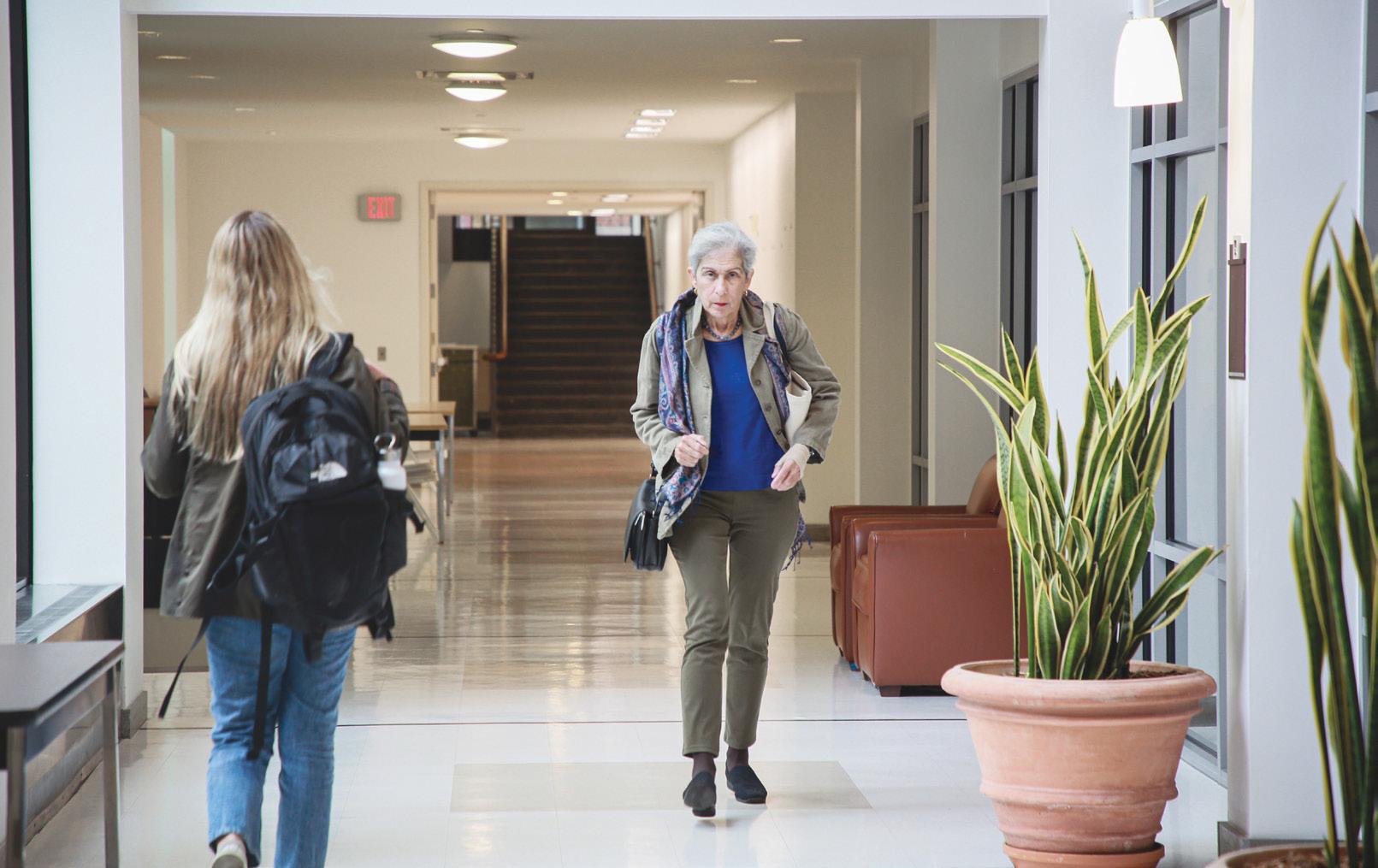
The Wharton School’s donor base has rebounded this year after a marked decline in 2024, according to The Wharton Fund’s recently released Donor Honor Roll — but several high-profile donors have not reinstated their contributions to the school after halting them over Penn’s response to campus antisemitism allegations.
Each year, The Wharton Fund releases its Donor Honor Roll, which is primarily composed of a list of donor names and their affiliation to Penn. The 2025 document recognized all individuals who have made gifts, pledges, or specific payments to Wharton’s unrestricted giving fund during the University’s previous fiscal year.
At 177 pages, this year’s report marked an increase in alumni contributions compared to honor rolls in recent years. In 2023 and 2024, gifts had declined as a result of donor backlash against the University over its response to antisemitism allegations on campus.
In the document’s opening message, Wharton’s Chief Advancement Officer Bill Bole wrote that donors strengthen the school’s “ability to meet change head-on and deliver the insights and talent the world needs most.”
“I’m proud to share the meaningful difference your gift has made,” Bole wrote to the donors.
“Thanks to your support, Wharton’s top students gained access to world-class business education, faculty pursued bold research, and innovative programming and global learning opportunities came to life.”
In a statement to The Daily Pennsylvanian, Bole emphasized the “generosity” of Wharton’s donor base.
“Beyond just a listing of names, we hope that when alumni look through the Honor Roll, they are reminded that they are a part of an extraordinary,
vibrant community whose generosity lights the way for Wharton’s future,” Bole wrote. “Each gift to The Wharton Fund — no matter the size — creates a ripple of impact, directly uplifting students and empowering the School to adapt, to grow, and to lead with vision.”
Bole also noted the difficulty to identify the “real impact” of financial support while organizing “annual funds.”
“The Wharton Fund is put to work in tangible ways that directly support the mission and work of the School,” he added. “We are grateful to donors who give with such devotion, and are proud to be able to remind them, both through the Honor Roll and over the course of the year, of the possibilities that their collective support creates.”
Despite the broader uptick in donations, several of Wharton’s most high-profile donors have not reinstated their contributions to the school. Wharton Board of Advisors Chair Marc Rowan, for instance, publicly cut financial ties with the University in 2023 and was not listed in the 2025 donor roll. At the time, Rowan described his decision as a response to the 2023 Palestine Writes Literature Festival, writing in an open letter that Penn was “a bastion of preferred speech.”
Rowan also called for donors to reduce their donations to a single dollar, and to forgo future donations until then-Penn President Liz Magill and then-University Board of Trustees Chair Scott Bok resigned from their positions. Some donors have followed through with this suggestion, such as Jonathan Jacobson, who in a letter to Magill stated that his $1 check “represents the first installment of a multi-year pledge.”
Prominent members of the Huntsman family similarly ended their donations to Wharton amid See WHARTON, page 2
JEAN PARK AND MAKAYLA WU | MULTIMEDIA EDITOR AND DESIGN EDITOR
Penn, City of Phila. release findings from afordable housing pilot program
A total of 301 households were randomly selected to participate in the program from the Philadelphia Housing Authority waitlists
ASHLEY
WANG Staff Reporter

The PHLHousing+ pilot program — a rental assistance project spearheaded by the Philadelphia Housing Development Corporation and the City of Philadelphia in collaboration with Penn — announced their findings last week.
Initially established in 2022 to help address housing insecurity in Philadelphia, the program provided rental assistance to participants in the form of monthly cash payments via a programspecific debit card. A total of 301 households were randomly selected to participate in PHLHousing+ from the Philadelphia Housing Authority waitlists.
The pilot revealed a potential new method of housing assistance in addition to evaluating the effectiveness of existing housing assistance, like housing vouchers. “Philadelphia really needs multiple housing strategies because no single approach will work for everyone,” PHA President and CEO Kelvin Jeremiah said in a press release documenting the program’s initial outcomes.
Newly released research — authored by researchers from the Housing Initiative at Penn, the Risk and Resilience Lab, and PHDC — reported that the program “has had significant positive impacts on the housing security of participating families” that are “comparable to those reported by households that receive rental assistance” through the Housing Choice Voucher program.
The brief detailed that cash rental subsidies “significantly reduced the chances of a household experiencing homelessness,” “improved the reported housing quality of households,” and decreased forced moves by 63-75% “relative to households that received no assistance” after one year, among other benefits.
Though direct cash fares have promising positive outcomes, the research brief still affirms that both cash payments and vouchers are necessary to maintain robust, effective housing assistance.
“Both forms of rental assistance are crucial
, from front page
backlash over Penn’s handling of on-campus antisemitism allegations and the Oct. 7, 2023 Hamas attack on Israel. Neither Jon Huntsman Jr. nor Peter
for ensuring low-income families have safe, stable, and affordable housing,” the brief reported.
Penn researchers are continuing to help analyze the program’s results, evaluating both direct cash payments’ effectiveness in comparison with other housing assistance as well as their impacts on individual outcomes.
Professor in the Department of City and Regional Planning and Faculty Director of HIP Vincent Reina said that the findings tell a clear story.
“There are clearly positive benefits of this cash transfer program,” Reina told The Daily Pennsylvanian. “Folks are clearly seeing higher levels of housing stability and improvements in housing quality.”
He added that the findings highlight the “reality that there’s a real opportunity — one for us to think creatively about how we apply rental assistance, but also to acknowledge that we need this broader tool set out there … to help households.”
In addition to promoting housing security, Department of Psychology chair and Psychology professor Sara Jaffee explained how the cash subsidies can potentially impact several other individual opportunities.
“We’re also very interested in a related set of outcomes,” Jaffee told the DP. “Does it enable our households to move to higher opportunity neighborhoods? We’re going to pivot in that direction, to start looking at the kinds of educational opportunities, employment opportunities, the kinds of health opportunities that exist in neighborhoods.”
Jaffee added in the initial PHDA press release that the “lessons learned from this program will offer invaluable insight about the impact of housing assistance on a broad set of adult and child outcomes and about the difference flexible assistance makes in people’s ability to access and maintain housing.”
Huntsman appeared on the 2025 list.
The changes on this year’s report also echoed trends from 2024. Both the 2024 and 2025 honor rolls omitted statistics summarizing total donors and donation figures, a departure from the 2023 edition, which included the total number of donors to The Wharton Fund and its loyalty societies, as well as year-over-year percentage changes.
What’s ahead for Penn Washington: A sit-down with inaugural Executive Director Celeste Wallander
Wallander now oversees all academic and professional programs offered by Penn Washington — including the Penn Biden Center and a range of policy initiatives
RIANA MAHTANI Senior Reporter
Penn Washington inaugural Executive Director Celeste Wallander spoke in an interview with The Daily Pennsylvanian about the program’s efforts in connecting the University with federal policy initiatives and public service opportunities.
Appointed in June, Wallander oversees academic and professional programs offered by Penn Washington — including the Penn Biden Center and a range of policy initiatives. She characterized Penn Washington as a “startup” that is now building toward a more robust presence in Washington.
The center is expanding its various projects as part of a larger aim to bridge the gap between academia and government, while also highlighting contributions from Penn researchers, Wallander explained.
“I think that, especially at a time when there is unfortunately a public narrative questioning the value of the universities in general, it is really important for policymakers, the media, the international community, and really the American people to understand that universities are able to help provide solutions that are really important to people’s daily lives,” Wallander told the DP.
Penn Washington was launched in June 2024 and has already hosted a wide range of programming for students, researchers, and faculty.
Wallander said the program’s next stage will involve increasing staff and institutionalizing Penn’s place in Washington with conferences, workshops, and briefings. She also emphasized a strong student-centered approach, as a key focus is connecting undergraduate students, graduate students, and postdoctoral students to opportunities through Penn’s alumni and professional networks.
When asked about the Penn Biden Center, Wallander noted that there was “clearly a different message coming out of America that the world is paying attention to.”
“We probably need to think of new ways that we can secure American interests but also cooperate with allies and partners and other countries in the international system,” she continued.
Additionally, Wallander acknowledged the challenges that come with navigating the cultural divide that exists between academia and policymaking. She noted the “cynicism” from both the government and university sides of the conversation.
For Penn researchers, she noted, engaging effectively in Washington requires patience and persistence. Rather than expecting “one idea or one piece of evidence” to drive policy change, faculty must build relationships and position themselves as reliable and trusted voices among the many competing perspectives in the political landscape.
To facilitate the cultivation of these relationships, Wallander told the DP that Penn Washington will launch a series of briefings offered to policymakers, journalists, and the broader political community in Washington. They also plan to host sessions for congressional staffers on issues ranging from health care and housing affordability to economic stability and emerging technologies.
Beyond responding to immediate policy questions, Penn Washington will also seek to identify issues that warrant more attention in Washington. Wallander said this proactive approach could help policymakers anticipate problems that may arise in the future, while also elevating Penn scholars in conversations about global challenges.
“While American leadership in the 20th century [was] incredibly effective, we probably can’t go back to those [models],” Wallander explained. Wallander brings to her new role more than two decades of experience in high-level federal government positions and three decades of experience in academic research and policy. Most recently, she served as assistant secretary of defense for international security affairs from 2022 to 2025, where she advised on defense and security policy in Africa, Europe, and the Middle East. She has also previously held senior roles on the United States National Security Council and in the Department of Defense, focusing on Russia, Ukraine, and Eurasia policy.

The reports are now primarily composed of donor names organized by affiliation and class year, without any broader metrics.
The 2025 list also included information on firstyear donors and membership in the Benjamin Franklin Society, Wharton Fund Loyalty Society, and Hattersley Society — all of which organized donations to the school.

discriminated against her based on her race is based on the same argument she made about the content of her speech. She expressly claims that Penn treats the content of antisemitic speech differently than her speech,” the filing read. “Again, she focuses on the content of speech, not the speaker.”
A request for comment was left with Wax. A University spokesperson denied a request for comment. Wax’s 53-page complaint — which she filed on Jan. 16 — contended that the University’s speech policy broke several federal laws. The lawsuit alleged that Penn violated Titles VI and VII of the Civil Rights Act of 1964, the former of which prohibits racial discrimination for programs that receive federal funding and the latter of which prohibits racial discrimination in employment.
The suit also alleged that Penn is in violation of the Americans with Disabilities Act by “failing to accommodate reasonably — or even minimally — Professor Wax’s then-ongoing cancer treatments,” as well as the University faculty contract that gives employees protection under the First Amendment.
In response to Wax’s suit, the University Board of Trustees moved to dismiss the case in March, arguing that Wax failed to state and support her claims.
In June, Savage denied Wax a preliminary injunction in her lawsuit, concluding that “Wax will not suffer irreparable harm in the absence of a preliminary injunction.”
In her motion for an injunction, Wax alleged that the University’s actions harmed her “reputation and continue to violate her civil rights” under federal law. At the time, Savage wrote that Wax had failed to prove that the University’s actions led to imminent reputational harm.
WHARTON
WAX, from front page
PHOTO FROM PENN TODAY
Wallander is the executive director of Penn Washington.
JAN MEJIA-TORO | DP FILE PHOTO
The PHLHousing+ pilot program selected 301 households to receive rental assistance through monthly cash payments distributed via a dedicated program debit card.
Pa. senators urge Penn to commit more resources for Jewish student safety in letter to Jameson
The Aug. 28 letter, which was also sent to four other higher education institutions in Pennsylvania, highlighted previous examples of antisemitism on Pennsylvania college campuses
PAIGE RAWISZER Staff Reporter
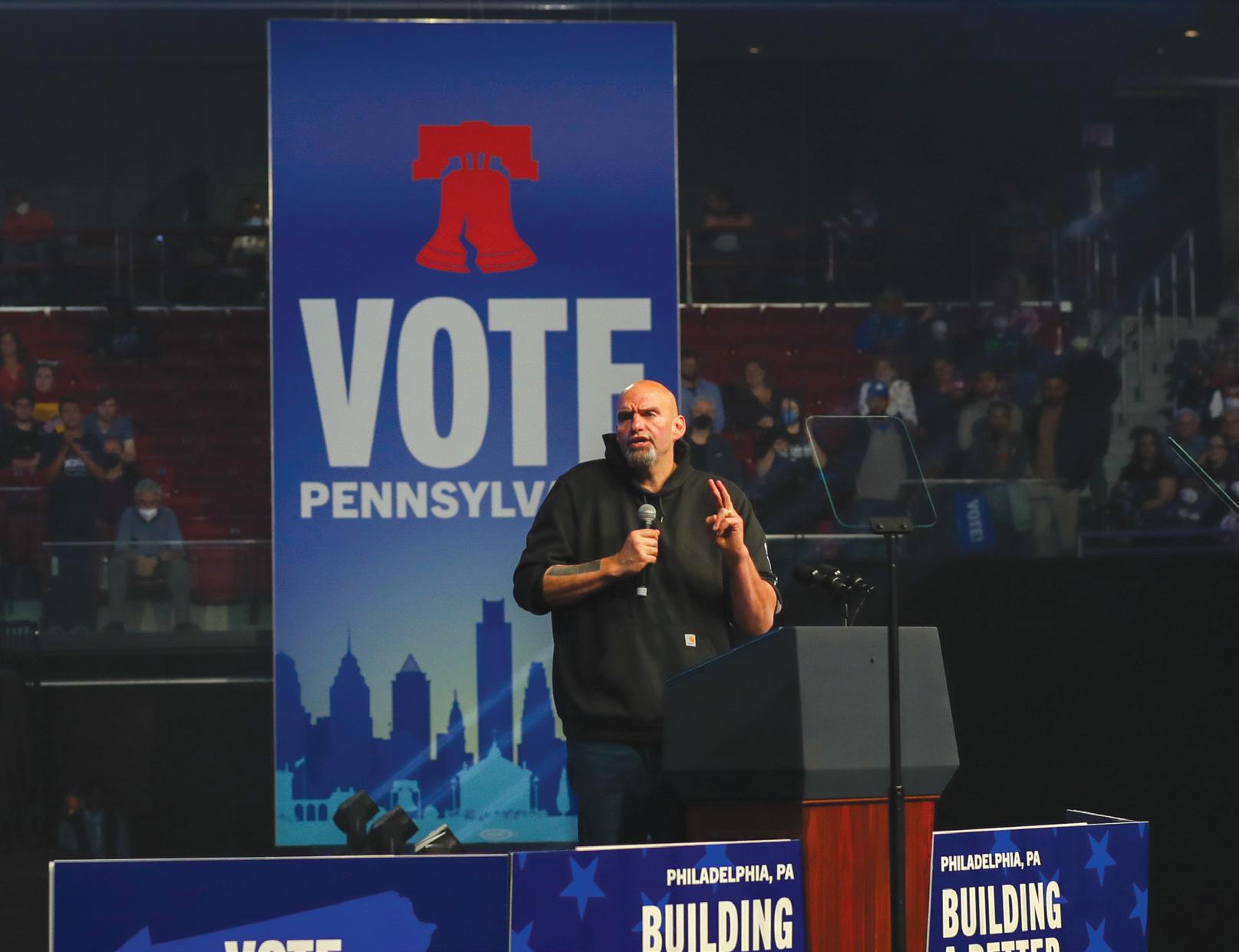
Sens. Dave McCormick (R-Pa.) and John Fetterman (D-Pa.) sent a letter last week addressed to Penn President Larry Jameson outlining concerns about Jewish student safety and student life on campus.
The Aug. 28 letter, which was also sent to four other higher education institutions in Pennsylvania, highlighted previous examples of antisemitism on Pennsylvania college campuses since the Oct. 7, 2023 Hamas-led attack on Israel. McCormick and Fetterman urged universities to take steps to protect Jewish students on campus and outlined mechanisms the University could adopt.
“We write to urge you, as a leader of a Pennsylvania university with a large Jewish student population, to commit to ensuring Jewish institutions on your campus are equipped to protect the students they serve,” the letter read.
A Penn spokesperson had not responded to a request for comment by time of publication. McCormick’s and Fetterman’s offices did not respond to requests for comment.
The message stated that “many Jewish institutions have been forced to cover the costs of additional security” and urged Jameson to commit to allocating additional resources to Jewish institutions if necessary.
Both Pennsylvania senators express their concern for Jewish students, including specifically in regard to their First Amendment rights.
“It is incumbent on all of us – especially our nation’s universities – to ensure vibrant Jewish life is
not compromised or driven into the shadows,” the letter read. “No student should feel like they must risk their safety to exercise their First Amendment rights to peacefully assemble and freely practice their religion.”
The letter also commended certain actions taken by the universities such as “enforc[ing] codes of conduct, disband[ing] illegal encampments, and suspend[ing] student groups that have repeatedly targeted and harassed Jewish students.”
In spring 2024, a 16-day Gaza Solidarity Encampment took place on College Green. Officers from the Penn Police Department — assisted by the Philadelphia Police Department — dismantled the encampment and arrested 33 people, including nine Penn students, on May 10, 2024.
The University also revoked Penn Students Against the Occupation of Palestine’s status as a registered student group on April 19.
Both McCormick and Fetterman have previously introduced bipartisan legislation aimed at combatting antisemitism. Fetterman has previously spoken out about antisemitism at the University, calling former Penn President Liz Magill’s congressional testimony on the the topic “a significant fail.”
In December 2024, the University opened the Office of Religious and Ethnic Interests in response to the recommendations outlined by the University Task Force on Antisemitism, the Action Plan to Combat Antisemitism, and the Presidential Commission on Countering Hate and Building Community.
Penn students say SEPTA cuts have left them facing higher costs, longer travel times
The changes could affect over 12,000 Penn employees and hundreds of students who rely on public transportation
Penn students and faculty are concerned about transportation access this school year as the first phase of SEPTA bus route eliminations and significant rail service cuts was implemented on Aug. 24.
The changes — which were approved in June when the SEPTA Board cited a $213 million budget deficit — include the elimination of 32 bus routes, reductions on 88 others, and a 20% reduction in services across buses and metro. There will also be fewer rail services along with the end to all special services, including the Sports Express.
A 20% service cut to Regional Rail services and a 21.5% increase in fares, which were scheduled to take effect this week, were halted per a ruling from a Pennsylvania Court of Common Pleas judge. SEPTA was ordered to stop any additional service cuts and fare increases that were not already in place as of Aug. 29 until further notice — though the Aug. 24 cuts will remain in effect. Fares are intended to increase from $2.50 to $2.90.
At Penn, the changes affect both employees and students who rely on public transportation. Over 12,000 Penn employees and hundreds of students use SEPTA to commute.
Some students told The Daily Pennsylvanian that the cuts are already making commutes more difficult.
Wharton sophomore Maggie Gao, who is originally from Philadelphia, said she uses SEPTA often to visit home. She expressed frustration over longer bus wait times due to the cuts.
“I remember, previously, without the service cuts, I was taking the bus to the subway stations, and it generally takes around 10 minutes or less. But now, when I have to get out of my house, I have to actually double check it extra early because I have to wait around 30 minutes for each bus,” Gao told the DP.
Unlike Gao, College sophomore Zinnia Zheng said that she “[doesn’t] really care” because she does not use SEPTA very often.
“I feel like it’s just people would have to work their schedule around the SEPTA schedule,” Zheng said. “Or they find some other alternative like Uber or bike or something.”
Fourth-year Graduate School of Education student Emmy Talian noted that as a graduate student, there are more “knock-on effects” to think about besides getting to and from campus — including being a parent and having access to schools for her children. Talian is a member of a local parent group in which there has been a “lot of chatter around the start of
JAMESON, from front page
“In Principle and Practice” was a “conceptual framework,” he told the DP, while the “Penn Forward” plan will serve as a way to “develop more tangible, concrete, actionable, timely projects and activities.”
When it was originally announced, “In Principle and Practice” outlined four principles — the ”Anchored University,” the “Interwoven University,” the “Inventive University,” and the “Engaged University” — and five practices: accelerating interdisciplinary pursuits, leading on contemporary challenges, growing opportunities and strengthening communities, deepening connection with neighbors and the world, and fostering leadership and service.
Those themes, according to Jameson, are “long lasting” and remain relevant to the development of “Penn Forward.”
“It’s a natural part of this kind of planning to initially generate high-level ideas and then get progressively more granular,” he said.
the Philadelphia School District about how bus route cuts were impacting children’s commutes to school.”
“While I do not have a school-aged child, that is something that was kind of on my mind ahead of living in this neighborhood and planning to send our kids to public schools, is that access to schools around the city is going to be limited,” Talian said.
She also shared concerns about her ability to use public transportation to conduct research in schools across the city.
“I’m in the Graduate School of Education, so my dissertation project involves going to teachers’ schools to do observations and collect data in Philadelphia School District schools,” Talian said. “While I haven’t yet started that stage of my research, I am sure that there’s going to be an impact on my ability to get to teachers that I work with who are in Northeast Philadelphia.”
Delaware Valley Regional Planning Commission officials also projected heavier traffic that could result in up to 275,000 more vehicles on the road as more riders turn to driving as an alternative to public transportation.
“There’s maybe more push to drive to campus for those of us who don’t live in West Philadelphia and to pay exorbitant parking fees instead of making use of public transit to access,” Talian said. “[This] really changes the calculus on how much money I’m going to be spending and how easily I’ll be able to access campus resources and campus activities as a graduate student.”
2023 University of Pennsylvania Carey Law School graduate Brian, who only provided his first name due to fear of retaliation, said that while his Regional Rail commute has not yet been affected due to the postponed cuts, he noticed that one of the bus lines that he regularly takes was less frequent after the first round of cuts went into place.
Brian also criticized the “real hypocrisy” of Pennsylvania state representatives from rural districts who are “expecting construction of their transit systems [and] their roads to be subsidized, while being unwilling to fund the transportation system of someone who’s living in a different area.”
“I think the cause behind the service cuts is pretty clear, which is that the Republican majority in the [Pennsylvania] state Senate is simply not willing to fund public transit,” Brian told the DP.
Talian shared a similar sentiment and said she hopes that Penn’s administration “put[s] some pressure on Republican lawmakers at the state level
The announcement outlined six working groups that will each focus on one of six domains of action: Undergraduate Education and Innovation; Graduate and Professional Training; Research Strategy and Financing; Global Opportunity and New Markets; Access, Affordability, and Value; and Operational Transformation. According to the announcement, the groups have been charged with three tasks — “question[ing] [Penn’s] legacy assumptions,” “propos[ing] bold, implementable strategies,” and “staying grounded in Penn’s values.”
Each of the working groups will consist of undergraduate students, graduate students, and postdoctoral students, as well as faculty, staff, and administrative support. The working groups, Jameson said, will not be given “specific direction” but rather will bring together “different perspectives” that “curate the very best ideas.”
“There are subject matter experts in each of these working groups, but there are also people who don’t necessarily bring content expertise who bring innovation and a deep commitment to our missions,” Jameson said.
A similar structure will be used to develop Penn’s artificial intelligence policy, though it
who are acting as if completely defending Philadelphia’s public transit system is an acceptable thing to do.”
“Penn is a very, very well-resourced political force in this state, and I would hope that they are using that leverage to advocate for adequate funding of Philadelphia’s public transit system, being one of the largest employers in the city of Philadelphia, in order to support their workers, in order to support their students,” Talian said.
Penn recently expanded its Commuter Benefits Program for faculty, which provides a 50% discount on Regional Rail passes and a 5% discount on contributions to the Health Equity Commuter Card that has a maximum discount of up to $105 per month.
Starting Sept. 1, the maximum monthly benefit will increase to $130 per month.
An announcement from Penn Transportation, Parking, and Commuter Services attributed the
decision to “challenges presented by the changes SEPTA is making in response to its unprecedented budgetary crisis.”
At a town hall held last week, local lawmakers and transit advocacy groups condemned the political nature of transit funding.
“There have been solutions that have been proposed to fund SEPTA and all transit agencies across the state, but we have been in this logjam with the Senate because they don’t want to fund mass transit for reasons that still elude me to this day,” Pennsylvania state Rep. Rick Krajewski (D-Philadelphia) said at the Aug. 28 event.
Further reductions, such as the elimination of five Regional Rail lines and the Broad-Ridge Spur, are scheduled for January 2026. A 9 p.m. curfew on all train services is also underway. SEPTA officials said that only new funding from the state legislature will prevent the cuts.

will not yet be implemented uniformly across the University. Jameson noted that while “there’s no question that AI is going to have a major impact on virtually everything that we do,” he will not “steer” the University’s policy on it.
Instead, rules surrounding AI use on campus will be left to the “Penn Forward” working groups, which will “study deeply, get information, speak with professors, [and] speak with students” to inform their decisions.
The groups are currently in the “charging” process, where they will plan out timelines for their projects and have them ready for review in early 2026. After these reviews, the implementation phase of the strategic vision will begin.
The announcement of Jameson’s new vision for the University comes after Penn’s Title IX resolution settlement with the federal government in July. The agreement has faced backlash from members of the Penn community who claim that the move undermines University values and makes transgender students feel “less safe” on campus.
When asked about the safety of Penn students with marginalized identities, Jameson said that there is “really nothing in these particular
working groups that’s focused sharply on safety” and that he believes Penn is in a “very good place in that regard.”
Jameson added that safety is a topic that is “focused on continuously” at the University by various stakeholders, adding that “people are always concerned to some degree about safety, but I think the level of concern has gone down over the last couple of years.”
The official announcement also noted the need to bolster Penn’s role in diverse areas of study, practice, and industry.
“Success means producing strategic clarity and executable choices that reflect Penn’s distinctive strengths and rise to the scale of our moment,” the announcement read. “Success also means something harder to measure: fostering trust that the institution will act wisely, move with purpose, and adapt without losing the primacy of its values.”
The strategic framework’s future goals, according to Jameson, include establishing the University as a leader across higher education.
“I want Penn to be seen as a leader,” Jameson said. “If we can make it easier for other institutions to follow our lead, then the whole higher education sector can move more quickly.”
ANNA VAZHAEPARAMBIL | DP FILE PHOTO McCormick and Fetterman addressed a letter to Jameson about Jewish student safety on campus.
AYMERIC MARCANTETTI | DP FILE PHOTO
An “emergency town hall” was hosted in West Philadelphia to discuss service cuts to SEPTA as legislators struggle to pass a state budget.


fail you — and that’s OK
NOISE & POISE | Taking 1,000-level courses is an opportunity, not a setback
My first week at Penn in August of last year was marked most notably not by new social opportunities or campus events, but by exams in which I tried to show that, yes, I do know what atomic orbitals are and how to take the partial derivative of a function.
Coming in, I thought my four chemistry classes, two physics classes, two biology classes, and six math classes across four years of high school had prepared me to make waves at Penn and immediately jump into the more advanced classes of my chemical engineering degree.
Penn does a decent job of providing students opportunities to get credit for math, chemistry, language, and biology through placement exams during New Student Orientation. In addition, a score of five on various Advanced Placement exams can get you credit or waivers for related courses, although the calculus credit has been removed for the 2025-26 school year and onwards.
With that knowledge, I worked through a painful number of placement exams during my very first weekend at Penn, running between lecture halls for testing and the Palestra for NSO programming. By the end of it, I had taken tests for six subjects over the span of three days, a rate not even comparable to finals or AP exam seasons. I even managed to miss the mandatory Consent Circles my peers were in because of a scheduling fiasco.
At the University of North Carolina at Chapel Hill, my state school and an incredible university in its own right, I was aware that I could start with over half a dozen credits because of my high school coursework. As I talk to other students here at Penn, I find that many could have also had an easier time getting credit for their workload at their local institutions thanks to more benevolent credit policies. There are a number of reasons Penn might appear strict about placement credits, and no, it’s not just to make our lives more difficult. For one, every student’s dual enrollment experiences from across the country might vary significantly in breadth of topics discussed, depth of lessons, and how grades are handed out.
While Penn’s departments offer to review transcripts to award credit, the policies still heavily lean towards having students
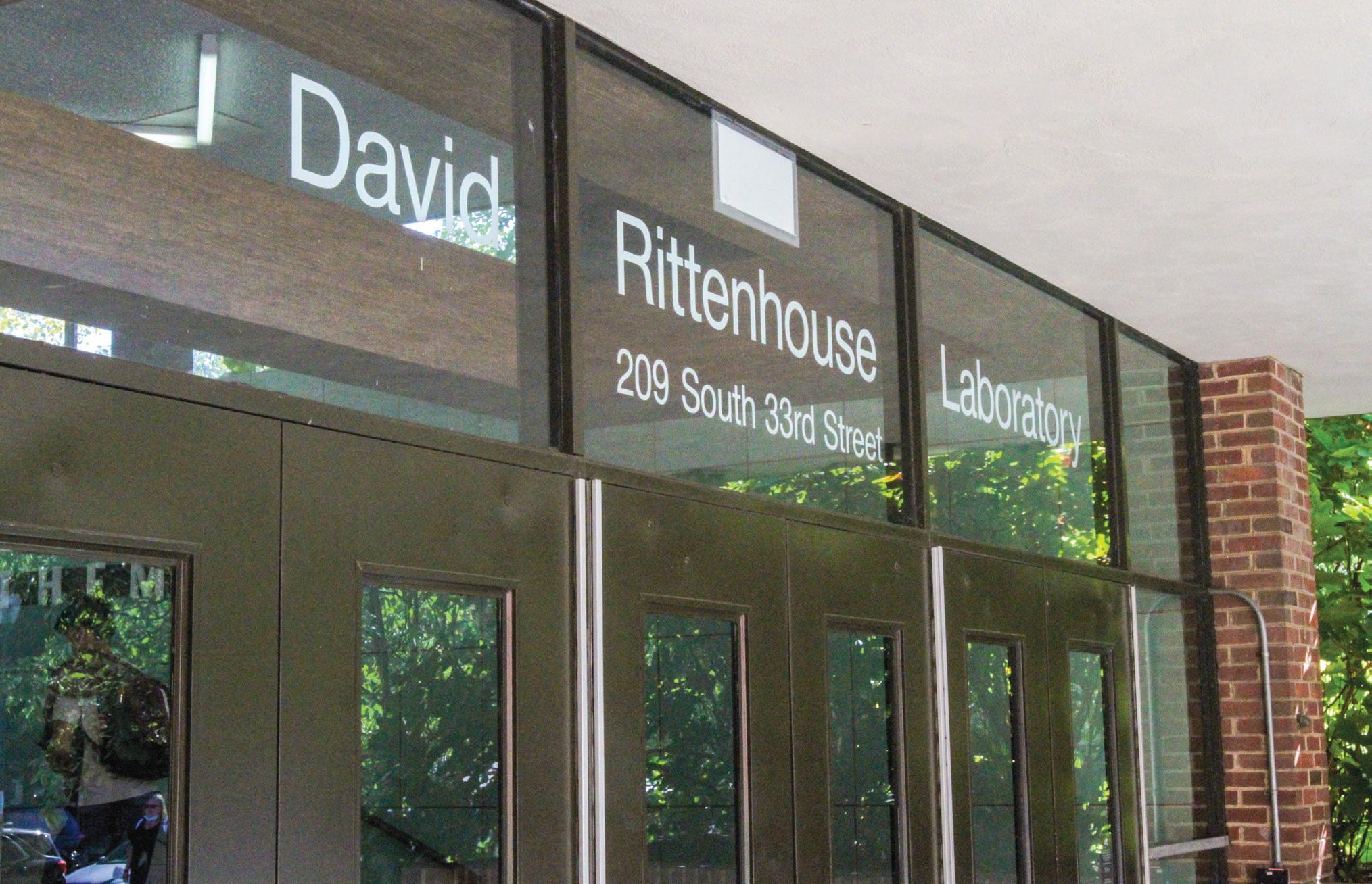
retake foundational courses — even if their transcript shows they’ve taken AP, International Baccalaureate, or a local university equivalent course.
Part of it could be intended to promote exploration of foundational courses at Penn before diving into more specialized courses, as students often end up changing their majors. I also think it has to do with Penn’s status in the Ivy League, where it is seen as important that students take Penn’s courses to bring us to the highest level of proficiency that only a school such as this could offer. Yet, for those still stubborn and daring enough to jump ahead, Penn concedes and gives us exams.
The results of my placement tests took what felt like forever to come out.
I had less than two weeks to drop or add classes based on the timing, and finally, I got one result from a professor:
“Dear Student, I’m sorry to inform you that you did not receive a passing score on the Fall 2024 Chem 1012 Equivalency
Exam. Please note, you are not eligible to take the Chem 1012 equivalency exam again at any time in the future.”
Similar emails would follow for my other tests. I was crushed. Honestly, I did not take my first major failure at Penn very well. I had the opportunity to prove what I’d learned in my high school courses, but instead I was already struggling with what was supposed to be high school content. Was I not a good student after all?
A year has passed now, and despite it all, I do believe Penn does a fair job with credit transfer opportunities through a combination of AP and IB recognition and testing programs. Although more transparency on exams could always help stressed first years, Penn does its job of choosing students who are best equipped to skip ahead. The vast majority of us do end up retaking several courses from our high school years, whether it’s ECON 0100 or BIOL 1101, but that’s part of the
Through the cracks: A murder mystery

crime has never been solved. I write as a journalist and a Penn graduate, hoping to renew interest in this case, which, I believe, could still be solved. Revsin was a Philadelphia native, a graduate of Lake Erie College in Painesville, Ohio, a daughter, and a sister. At Northeast High School, she was a cheerleader and a member of the choir. At Penn, she was pursuing a graduate degree at the Annenberg School for Communication. Revsin lived with her boyfriend, also a Penn graduate student, in the El Vista, an apartment building at 4530 Osage Ave. The building is still there, but in 1980, the neighborhood was much more dangerous than it is today. At 3:15 p.m. on Friday, March 21, 1980, the boyfriend returned to the apartment and found Revsin dead on the floor. A knife was lying near her body. She had, according to the coroner, been “slashed and beaten and stabbed.” Her death was ruled a homicide. The boyfriend had an airtight alibi: He had been playing basketball with friends at Gimbel Gymnasium. Neighbors reported hearing no screams or signs of a struggle emanating from the apartment that day. There was no sign of
forced entry, suggesting Revsin may have known her attacker. It was the kind of crime that would have been expected to generate considerable media interest: a young woman found brutally murdered in her own apartment. But Revsin had the bad luck to be murdered on the same day that the mob boss Angelo Bruno was assassinated while sitting in a parked car in South Philadelphia. The Bruno murder was one of the most sensational crimes in the city’s history, and it sparked a wave of mob violence that would last for years. Perhaps it’s not surprising that, by comparison, the murder of Revsin attracted little attention from the media and, it seems,
deal when you choose to earn a Penn degree. It comes down to the school’s goals for exploration, mastery, and building a cohesive underclassman experience instead of simply course-maxing. I don’t want to discourage you from taking advanced credit exams if the opportunity arises, because who knows? You might be better equipped to pass than I was because of your curricular or extracurricular experiences. But I want to remind you not to place your worth on these tests nor let suboptimal results define your next four years. If you, like me, chose Penn, then you probably did it not for the enticing credit transfer opportunities, but for something else. Lean into whatever that is.
NAMRATA PRADEEP is a College and Engineering sophomore from Raleigh, N.C. Her email address is namratap@ seas.upenn.edu.
investigators. After her autopsy, none of the Philadelphia papers gave updates on the investigation.
The utter lack of information about this case in the papers and online is remarkable. I entered Penn in September 1984, less than five years after the murder, and during my junior and senior years lived less than two blocks from the scene of the crime, yet I never heard anything about it. I only learned of the murder when I recently went down a Philadelphia mob rabbit hole and chanced upon an article about it in the same edition of The Philadelphia Inquirer that reported on the Bruno slaying.
Despite the many years that have passed since the crime occurred, it seems eminently solvable. If police still have in their possession the apparent murder weapon — the knife found near the body — it should be tested for traces of the perpetrator’s DNA. I have written to Philadelphia District Attorney Larry Krasner, Philadelphia Police Commissioner Kevin Bethel, the Penn Police Department, and other officials and agencies, but none has responded to my suggestion that the knife be tested.
Although the case is still open, I suspect it has not been actively investigated in decades. But if the killer was around Revsin’s age, 25, at the time, he or she would now be about 70 years old, still relatively young considering the case is now 45 years old.
It is my hope that publicizing this unsolved murder will compel investigators to take another look at it. Cold cases live and die on public attention. Hopefully, buried somewhere in the bowels of a municipal building is a cardboard box containing the knife that killed Revsin. I beseech authorities to find it and test it, and all these years later her killer may be brought to justice. As overdue as it would be, justice in Revsin’s case would be no less sweet.
MATTHEW ALGEO is a 1988 College graduate and an author, journalist, and historian. He hosts “Morning Edition” on Kansas Public Radio. His email is malgeo@ku.edu.
MATTHEW SCHWARTZ | DP FILE PHOTO
Columnist Namrata Pradeep discusses Penn’s credit exam culture.
INSIA HAQUE | DESIGN EDITOR
Guest columnist Matthew Algeo highlights the unresolved case surrounding the murder of a Penn student.

this more than twomonth delay has severely affected transit. An over $213 million recurring budget deficit for SEPTA has resulted in a 45% reduction in service and an upcoming fare raise averaging 21.5%. With no budget passed to fill the gaps, these changes have already started to take place. Beginning Aug. 24, over 32 bus routes were cut with changes to another 88 routes. On Sept. 1, fares were set to rise — though fare increases were put on hold after a recent judicial ruling — and more changes are scheduled through early 2026.
SEPTA supports over 800,000 daily riders, and although funding cuts to transit will have minimal effects on me as a Penn student, it will meaningfully impact longtime residents of Philadelphia. High school students commuting to school, health care workers, and residents more broadly are bracing for these changes, and it’s already a mess. Many Philadelphia-area high schoolers returned to school on Aug. 25, causing multiple students and teachers who relied on SEPTA to wait over an hour, with some parents even switching their children’s schools due to delayed bus routes and inaccessibility. Private companies are also getting involved — Uber is now offering free rides to senior citizens to meet the increased need for transportation.
Not only do these changes affect workers and students, but they will also ultimately affect businesses and the entire Philadelphia economy. Unreliable public transportation will force more people to get vehicles, and unlike Phoenix, which is built for cars, Philadelphia does not have the infrastructure to support an overflow of drivers.
More traffic, losses in business, and other negative economic outcomes may arise if the SEPTA situation isn’t fixed, and soon. The city is already facing lawsuits regarding the service cuts, and it’s likely that more are lined up as we speak.
As Penn students, we are all members of the Philadelphia community, and it is important to be aware of what’s happening in the city we live in. Longer wait times and raised fares impact us all, and an influx of traffic into University City will be noticeable, especially for pedestrians. I encourage you to continue to use public transportation and break out of the Penn bubble, and also recognize the privilege that comes with living in University City.
Like the majority of Penn students, I am lucky to live within walking distance of my classes, utilize the oncampus gym, and have the convenience to shop at local grocery stores. Before moving off campus, I ate at dining halls and had an even easier time getting what I needed without relying on any method of transportation besides walking. The reality for the majority of Philadelphians is quite different. I hope the city is able to rectify these changes and show up for its citizens, but until then, I will adjust my schedule accordingly and show up a little bit earlier for what used to be a quick ride.
MIA VESELY is a College senior from Phoenix studying philosophy, politics, and economics. Her email is mvesely@sas.upenn.edu.
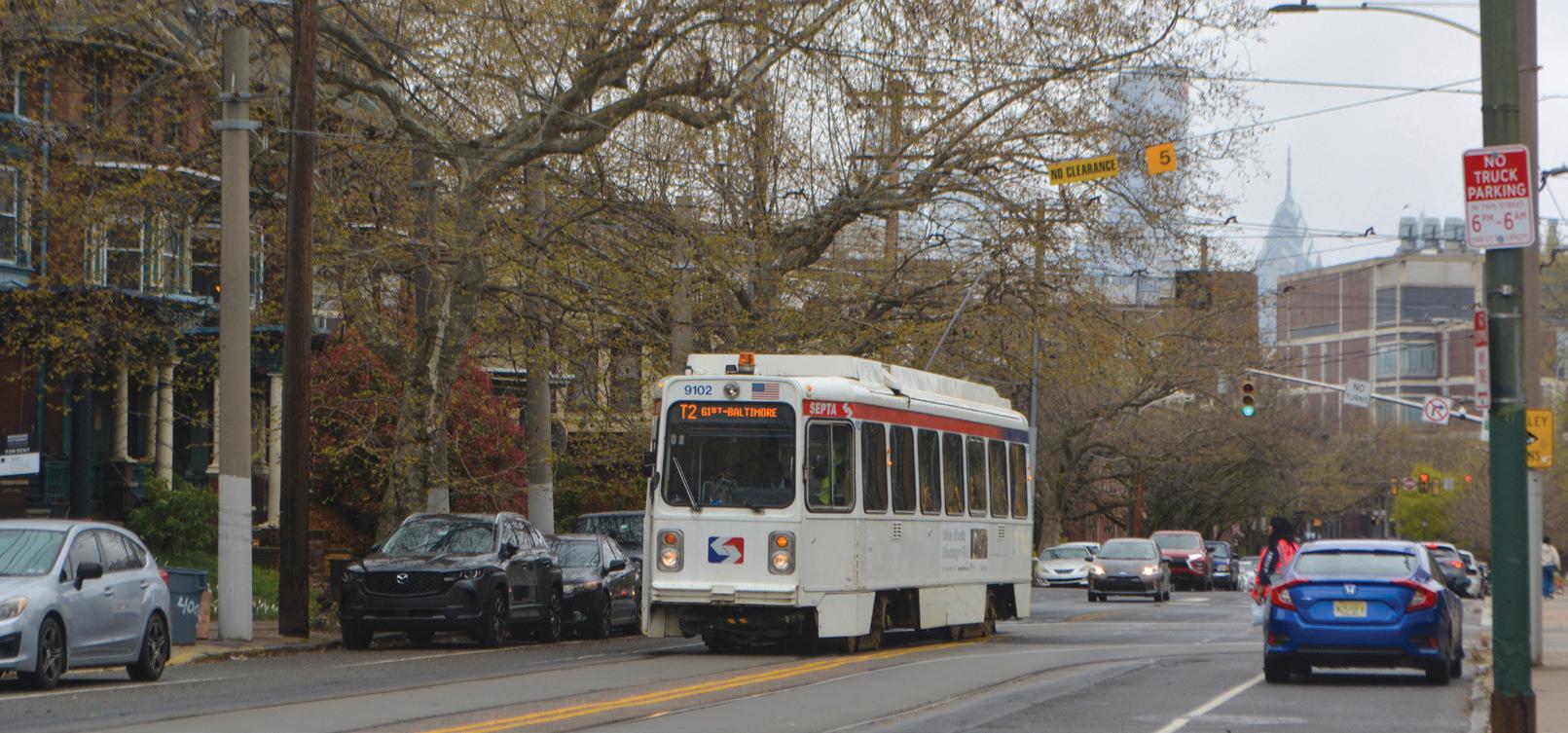

ANANYA’S ANALYSIS | AI can’t replace the liberal arts

On the first day of class, I found myself zoning in and out as each of my professors dutifully recited their artificial intelligence policies; all six of one, half a dozen of the other, as they say. Later that evening, when I scrolled through Instagram and LinkedIn, I couldn’t escape the endless stream of AI startup announcements — companies fresh out of Y Combinator, proudly branding themselves as the future. AI has become ambient in our lives, woven into every conversation, every industry update, every casual scroll — for better or for worse. It is no longer a tool we occasionally use, but a constant hum in the background of modern life.
As a student in the College of Arts and Sciences, pursuing a liberal arts degree alongside millions of others across the world, I’m no stranger to the critique: The humanities are “impractical,” “unemployable,” or simply the punchline of tired jokes about baristas with philosophy degrees.
In an economy obsessed with immediate returns, the liberal arts can seem frivolous. But in an age when no one can say for certain which professions will even exist in a decade — when AI could just as easily generate a financial model as a press release — I am increasingly convinced that the liberal arts will endure, perhaps more than anything else.
The truth is, we’ve become so desensitized to AI’s presence that we hardly notice how deeply it shapes our thinking — or how it discourages us from thinking at all. We outsource even the most trivial decisions, like picking outfit combinations and writing emails, as well as more consequential tasks, like using AI as a kind of parasocial therapist.
In education, its misuse is especially striking. Few of us can honestly claim we’ve never leaned on AI to draft an essay, brainstorm an argument, or finesse a discussion post. The temptation is ever present. But every time we paste a prompt into ChatGPT and let it do the intellectual heavy lifting, we cede a little more of what makes us human — our capacity for critical thought. We are actively becoming lazier and more willing to settle for surfacelevel answers. What gets lost is the ability to wrestle with ideas, to sit with the discomfort of not knowing, to embrace the long, messy process of genuine understanding.
That is precisely what a liberal arts education demands. It forces you to read closely, to analyze critically, and to make connections across history, literature, philosophy, and politics. It trains you to grapple with uncertainty instead of covering it up with a neatly packaged answer. In a world where AI promises efficiency above all else, the liberal arts insist on something slower, more uncomfortable, but infinitely more human: the discipline of thought. Professional training — like, say, at the Wharton School — undeniably has its value. It offers access to powerful networks, technical expertise, and clear career pipelines. But the reality is that many of those professional roles are already being reshaped or even entirely replaced by AI. Some AI models can now replicate a striking percentage of a junior banker’s tasks. Goldman Sachs CEO David Solomon noted a project that once took a team of analysts six weeks to finish can now be 95% completed by AI in just minutes. While those jobs won’t disappear entirely, their nature will transform in unpredictable ways. Efficiency will rise, but human contribution will shrink. What AI cannot do, however, is think. It cannot wrestle with ambiguity or construct meaning. It cannot trace the arc of history, weigh competing ethical claims, or uncover the emotional resonance of a poem, because AI ultimately cannot replicate the human experience.
Even as Microsoft and other firms release reports warning that roles like political scientists, English professors, and historians are “at risk,” I remain convinced that these very disciplines — rooted in the liberal arts — will prove the most resilient in the age of AI. These disciplines are inherently focused on asking better questions and pursuing intellectual curiosity, as opposed to quick answers. They are, in essence, the last safeguard of uniquely human thought.
ANANYA SHAH is a College sophomore studying philosophy, politics, and economics from Atlanta. Her email is aoshah@sas.upenn. edu.














































































HOPE APPLEGATE | STAFF PHOTOGRAPHER
Senior columnist Mia Vesely analyzes cuts to Philadelphia’s public transportation and their potential effects on students.
DEVANSH RANIWALA | STAFF PHOTOGRAPHER
Senior columnist Ananya Shah asserts that the liberal arts education will remain a lasting pillar in the era of AI.
Women’s soccer goalkeeper Annabel Austen wins Ivy League Defensive Player of the Week
This is Austen’s fourth career Ivy League Defensive Player of the Week award, after earning three last season
VALERI GUEVARRA Sports Editor
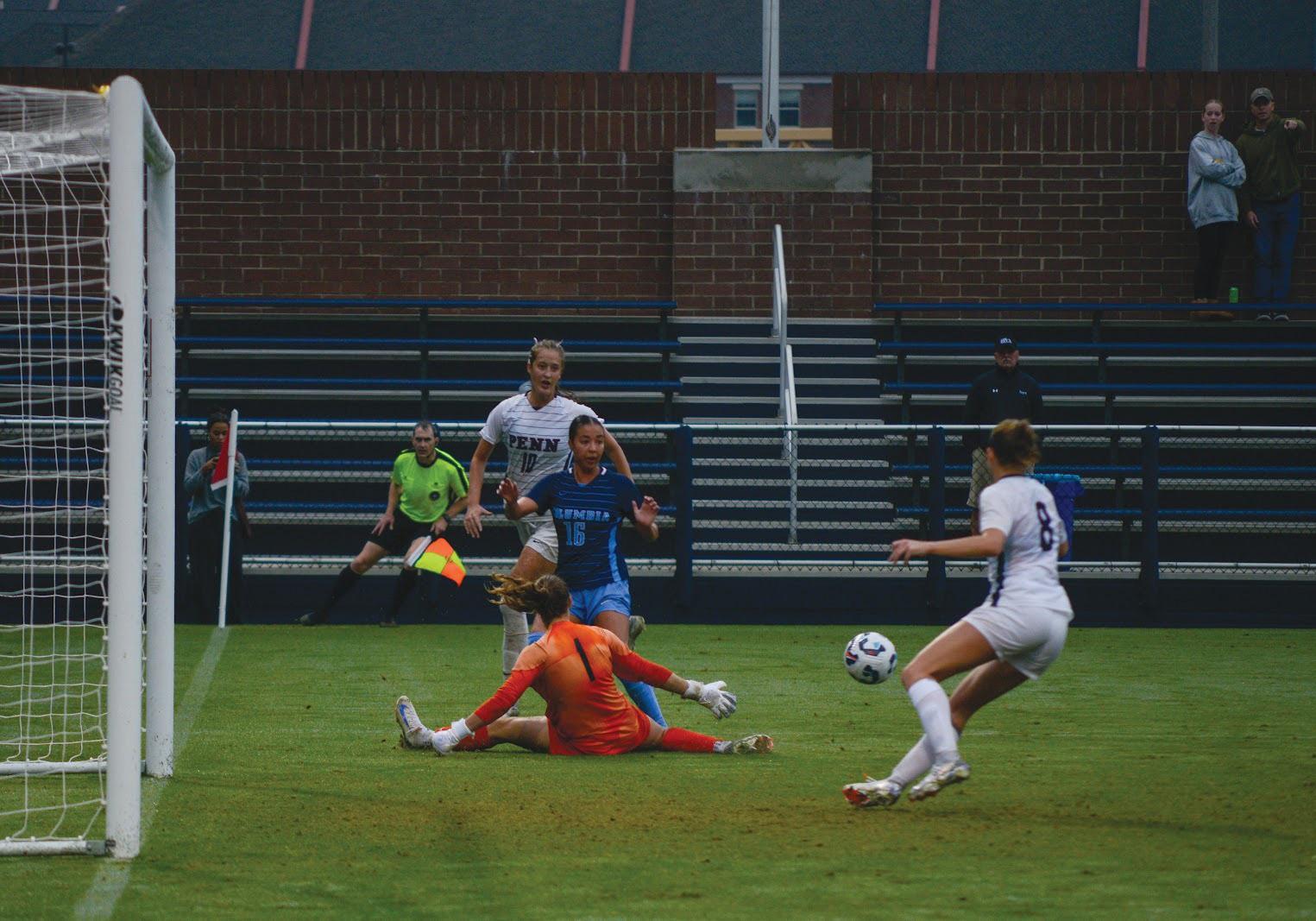
SHUTOUT
, from back page
“The [goal] gave the team another boost of energy and good momentum to start the second half,” Wagoner said.
With the Quakers looking to create on offense, a cross by senior midfielder Erickson Sakalosky was deflected but then put strongly in the back of the net by Cayelli. As the half wound down, Loyola began increasing the pressure and moving into the Quaker’s half. With a foul called on Penn, Loyola was granted a free kick outside the box, which set up an opportunity they had been hoping for. However, in his first game starting for the Quakers, Howard protected Penn’s lead, making his third save of the game.
“We knew they were going to be direct, so managing at the end was critical,” Howard said. In response, Dahlen scored his second goal of the night with a put back after a low shot from Howard left the Loyola goalie off balance.
Penn changed their lineup with just under seven minutes of play, and the Quaker defense held strong against any last efforts Loyola through their way. The Quakers ended the game outshooting Loyola 18-6, with 10 of those shots reaching the goalkeeper.
“I think we all know this was a great result, but it’s just one game of 16 that we have right now, so we’re looking forward and trying to constantly build on this and keep taking one step each day,” Cayelli said.
Dahlen’s performance — his first collegiate start — earned him the first Ivy League Offensive Player of the Week nod of the season.
“[The game win] felt great. It’s my first time starting a season game. … A lot of work [has] been put in through last year, and I felt prepared and ready,” Dahlen told The Daily Pennsylvanian after the game.
After this strong opening to the season, Penn men’s soccer notched No. 21 in the United Soccer Coaches College Rankings.
The Quakers hope to build off this strong start to the season with their next game at Seton Hall on Friday.


Penn women’s soccer is starting off hot this season, and senior goalkeeper and captain Annabel Austen is leading the charge.
The Concord, Mass. native earned Ivy League Defensive Player of the Week after shutout performances in the net in matchups against Drexel and George Mason last week. In the draw with Drexel, Austen put five saves to her name, and in the latter game, Austen continued her perfect start to the season with two saves on both shots from the Dragons.
The honor marks Austen’s fourth time being awarded Ivy League Defensive Player of the Week in her career. She earned three last season for performances in Ivy play against Cornell, Dartmouth, and Princeton.
“I’m not surprised at all [at our performances],” Austen told The Daily Pennsylvanian. “We left last season with a lot to be desired and went into the winter, went into the spring, really focused on how we wanted to perform this fall and worked really hard every single day.”
Austen credited the team’s strong start to the depth of the team and coach Krissy Turner — who is in her fourth year at the helm of the program.
“We’ve been growing the last four years under our coach … and she’s been building this program up gradually, and I feel like we’re finally hitting that turning point where we have the culture we want, the talent we want, the players we want. It’s all coming together,” Austen added.
Turner has created a culture that strikes a balance between supportive family and competing to win.
“At the end of the day, she’s started to push ‘Yes, we’re a family, but we also want to win the Ivy League title’ and that’s the culture that we’ve been building up and working on. … I really appreciate [that she has] really let us direct how we want to grow and the culture we want to create,” Austen said.
Penn women’s soccer currently has a 2-0-1 record and is set for its first season road trip to Fairleigh Dickinson on Thursday. The Quakers will then return to the Keystone State to battle Lafayette on Sunday.
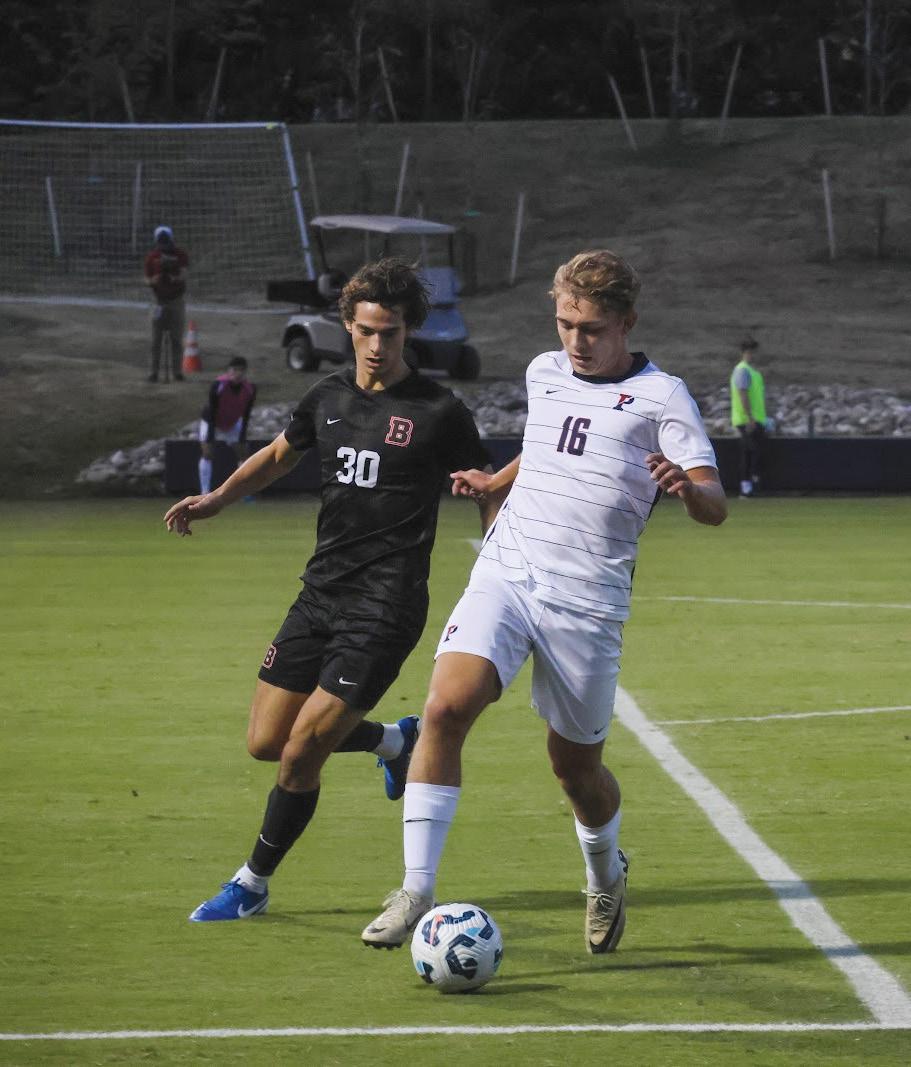
















CARLY ZHAO | STAFF PHOTOGRAPHER Austen pictured defending the goal against Columbia on Sept. 28, 2024.
LACHLAN PEPERSACK | DP FILE PHOTO
Dahlen pictured evading a Brown defender on Oct. 12, 2024.
Men’s lacrosse hires new assistant coach Mike Rastivo, retains defensive
coordinator
Casey Ikeda
During his fve seasons at Saint Joseph’s, Rastivo brought the Hawks to two NCAA championship appearances
JUSTIN
LEE Sports Editor
Every new season brings a new roster with both familiar and new faces at the helm.
Penn men’s lacrosse, under the leadership of new head coach Taylor Wray, added Mike Rastivo as an assistant coach and retained Casey Ikeda as defensive coordinator for the upcoming 2026 season. Rastivo previously coached under Wray for five seasons at Saint Joseph’s, while Ikeda has been an assistant coach and defensive coordinator for Penn men’s lacrosse since 2017.
Rastivo, who joined the Quakers shortly after the appointment of Wray as head coach, also left a lasting mark at Hawk Hill. Rastivo previously coached under Wray for five seasons at St. Joe’s, where they notched the Hawks’ first two NCAA Championship appearances in 2022 and 2024.
In 2022, Rastivo and Wray brought the Hawks to No. 1 nationally in win percentage and No. 10 overall ranking the following season. Rastivo also coached many accomplished players,
Smith | We want Nova: It’s time for Penn football to reignite its rivalry with Villanova
The timing could not be better — the return of a yearly matchup between the Philadelphia schools will help usher in a new era of Penn football
CONOR SMITH Sports Associate
Ten years ago, Penn football did the unthinkable: The team beat Villanova.
On Sept. 24, 2015, the Quakers stunned Villanova, 24-13. The win over the Wildcats marked the program’s first against their Philadelphia foe in 104 years. The star of the game? Then-sophomore wide receiver Justin Watson.
Many know Watson, who now plays for the Houston Texans, as an eight-year NFL veteran with three Super Bowl victories. For the fans who clambered into Villanova Stadium 10 years ago, he may be remembered as the receiver who finally put Penn over Villanova. He logged 87 yards and Penn’s two offensive touchdowns.
Along with being Penn’s first victory against Villanova since 1911, the victory also marked coach Ray Priore’s first collegiate win in the role. Priore took the moment to make a lighthearted jab at student sports reporters who picked the Quakers to continue their losing streak.
“The school paper said we needed a Hail Mary. Well, God was on our side today,” he told The Daily Pennsylvanian in 2015.
One would think that Penn’s win would reignite the rivalry, which at this point, saw the teams face off in 12 straight seasons. They would be wrong. Penn and Villanova have not played since. Now is the perfect time to bring the rivalry back.
From Penn’s perspective, the timing could not make more sense. Following a successful proposal by the Ivy League Student-Athlete Advisory Committee, the conference announced in December that it would begin participation in the FCS playoffs. Before this, Ivy League schools were barred from the postseason, spanning back to the 1945 Ivy Group Agreement, which also banned athletic scholarships.
“It’s a step, which we feel is great not only for Penn football but the league itself, and to get a chance to see us on the national stage,” Priore said following the announcement.
With this major change for the Ivy League schools, it has been speculated by some (myself included) that the league’s 10-game schedule could be the next tradition to go. In June, the NCAA adopted a proposal for the FCS to play standardized 12-game seasons starting in 2026. However, the NCAA’s guidance is still just a “recommendation” for FCS teams and conferences, meaning Ivy League schools are not
including All-American Zach Cole. As a player, Rastivo also represented the Hawks, leading the team to four Northeast Conference postseason appearances as a three-year team captain.
“It is incredibly exciting and humbling to have an opportunity to coach at one of the most prestigious institutions in the world. I am excited to help our student-athletes achieve their goals on and off the field,” Rastivo said.
On the defensive side of the ball, Penn men’s lacrosse will have a familiar face at the helm.
“I’m incredibly happy to retain Casey Ikeda as the Charles B. Leitner III Defensive Coordinator,” Wray said in a Penn Athletics release. “I’ve watched the job Casey has done with Penn’s defense over the years and have always been impressed by the organization, discipline, and toughness his units consistently display.”
Having served as a defensive coordinator since 2017, Ikeda helped bring the team to Ivy
League Tournament Championships in 2019 and 2022, with an 11-5 overall finish in the latter year. Across his eight seasons, Ikeda coached 16 All-Ivy players and nine All-Americans, including 2023 College graduate short-stick defensive midfielder Piper Bond and Premier Lacrosse League draft fifth-pick 2025 College graduate Brendan Lavelle.
“He’s universally respected by the players, has a deep connection to the program, and is already making his presence felt on many different levels as I get acclimated. We’re fortunate to have him back to lead our defense,” Wray said.
Penn men’s lacrosse, which placed No. 12 in the nation at the beginning of last season, compiled a 4-10 overall record — their worst finish since 2012. They also recorded a 1-5 finish in the Ivy League, coming in seventh in the Ancient Eight. But as the team rounds out its coaching staff to start off the season, the Red and Blue plan to notch an NCAA tournament spot and have a strong tournament run.
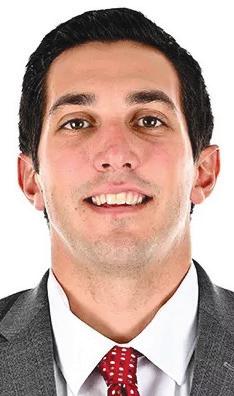
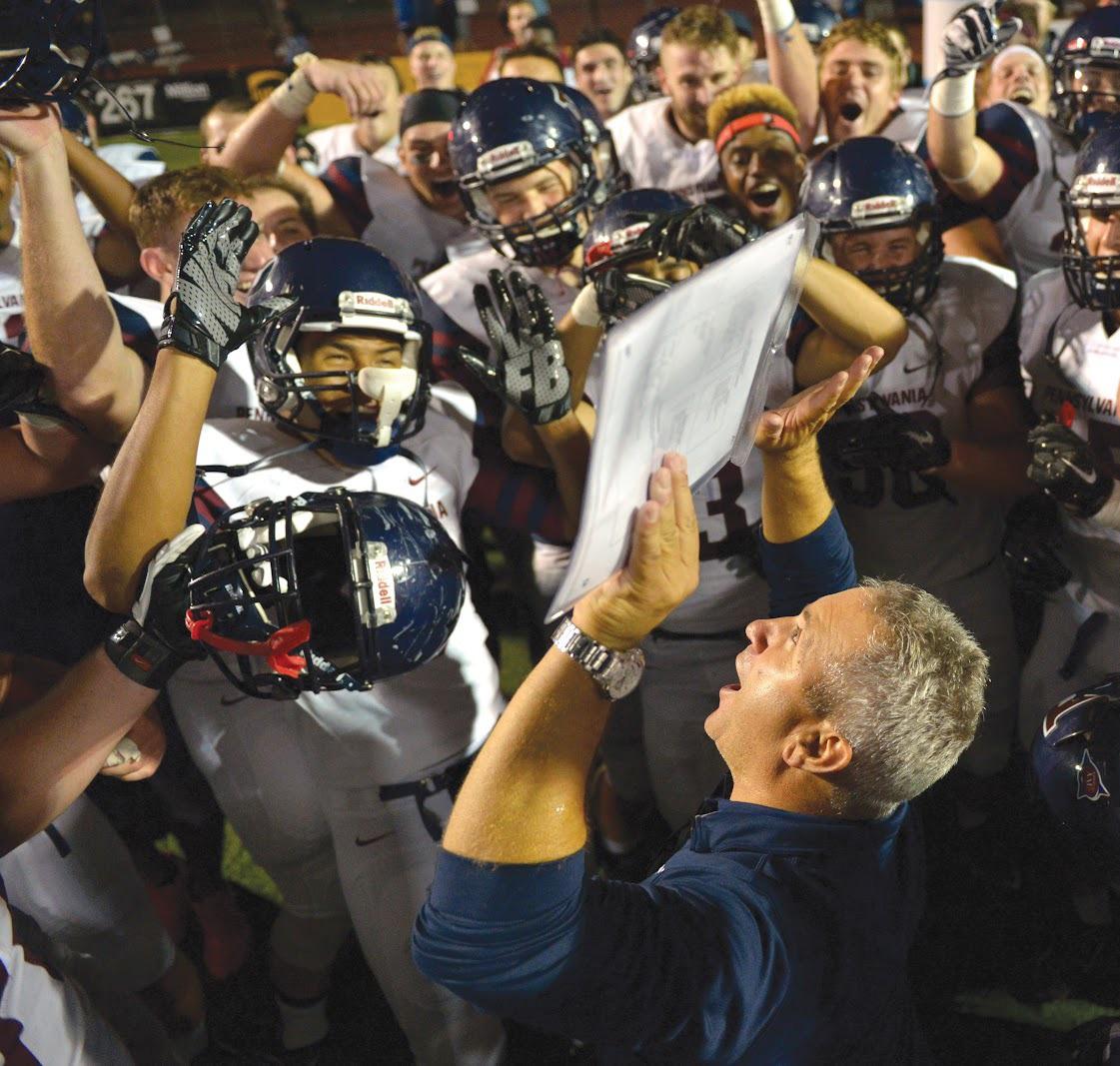
required to add two games to their schedules.
The speculation that the Ivy League will take the recommendation is fueled by its schools’ recent willingness to break away from the antiquated Ivy Group Agreement. It seems the conference is looking to further align itself with its FCS contemporaries. If this occurs, Penn will seek marquee matchups to fill out its extended schedule.
Enter Villanova.
The return of a yearly matchup between the Philadelphia programs would help usher in a new era of Penn football. Unlike Philadelphia college basketball’s Big 5 Conference, there is no association of Philadelphia-area football teams. With only Penn, Villanova, and Temple fielding teams, the city doesn’t have enough football programs to form a conference. Additionally, the Owls play in the FCS, making a consistent slew of games against Penn and Villanova very improbable.
U.S. OPEN, from back page as he won decisively in straight sets (6-1, 6-2) last Wednesday.
winner, followed by tournaments offering 750, 500, 300, and so on. The juniors at the top of the rankings automatically get a spot in the main draw of the U.S. Open Junior Championships, while the others compete in the qualifiers to earn one of the remaining spots.
Playing on the junior circuit is no new experience for Spurling. He began playing internationally in 10th grade, completing school online in order to train and travel to tournaments. Currently, he’s No. 101 in the International Tennis Federation’s ranking of juniors singles and has been ranked as high as No. 85 in his career. Spurling’s first opponent in singles in the tournament was Spanish player Xavi Palomar, who was seeded eighth in the qualifiers. Though Spurling was unseeded, he was unfazed in the matchup,
“I went into it obviously having nothing to lose, because he was seeded and I wasn’t, but I was coming in with a lot of confidence,” Spurling told The Daily Pennsylvanian.
“The combination of those things, just let me play really free, but also, like, really smart, and with it, with a good game plan,” Spurling added.
Unfortunately, the day after, his second match didn’t go as smoothly. He faced 10th seed Tudor Batin, who won 6-1, 6-3.
“My opponent just played really well. … It was like I had chances in the second set, but he was just better than me on the day, I think,” Spurling said.
Despite not going further, Spurling reflected positively on his singles experience at the tournament.
“It’s been really fun. It’s been a really cool experience. It’s always been my dream to play in a Grand Slam. That’s one of the reasons why I
Temple may be awful by FCS standards, but its team would consistently trounce their Philadelphia counterparts.
Having a true city rival in Villanova again would excite Penn fans who would otherwise check out during nonconference play. The data is there. A DP analysis of Penn football attendance found that the most-attended Penn home game since 2003 was against Villanova.
On Sept. 24, 2005, 23,257 attendees watched the Quakers take on the Wildcats at Franklin Field. Last season, the most-attended home game was against Harvard and garnered 12,286 attendees. In total, Penn hosted over 20,000 fans five times since 2003 — twice against Villanova and three times against Princeton. The Tigers’ matchups all landed on Homecoming, a game that is known to bring in non-football fans every year.
Even though Penn was not winning the
started playing international tournaments in the first place. I didn’t get the chance to play any of the other Grand Slams, so doing this was special.”
Spurling’s Grand Slam experience isn’t quite over yet. After another doubles team pulled out due to injury, Spurling and his doubles partner Ford McCollum were chosen from the alternates list to enter the doubles main draw. McCollum, a high school senior committed to Princeton, is a childhood friend of Spurling.
“It was also our dream, like singles aside, for us to play our last doubles match, at the U.S Open as well … so I feel like that’s also super special to play with him one last time,” Spurling said.
In the first round, the pair faced the most recent winners of the Wimbledon and French Open juniors, Oskari Paldanius of Finland and Alan Wa żny of Poland. A tough draw, yes, but one that Spurling hoped to attack head-on.
“Going with a bunch of intensity, and just showing them that we’re not afraid to play our game,
games, Villanova sure brought fans to Franklin Field.
Speaking of, there is reason to believe that the next chapter of the rivalry would be much less lopsided than the past. As Penn and the Ivy League are now playing for an FCS title, recruiting will likely see a bump. Players care about winning a real championship, not splitting an Ivy title three ways. Penn’s further integration into a legitimate FCS team will raise the level of play. Priore would agree.
“I think it’s great for Ivy League football, and I think it’s great for kids that we’re trying to recruit — they want to see themselves play at the next level,” he told The Philadelphia Inquirer in April.
With recent changes to the Ivy League and the FCS, it is finally time for Penn and Villanova to face off again. This time around, things should be different.
even though we know how good they are,” Spurling said, “Especially in doubles, if you’re having fun and your energy is good, you always play better.”
That mindset certainly worked, as the pair won 7-6, 6-4 on Tuesday. In round two, they are set to face Jamie Mackenzie and Dominick Mosejczuk.
As one chapter of his tennis career closes, another is opening. Trading the camaraderie of the juniors for the tight-knit friendship of a college team was certainly an adjustment, but not a totally unwelcome one for Spurling. Before focusing fully on tennis, he played soccer, where he loved the team dynamic.
“I like being on a team, and playing for something more than yourself is always really nice. And just the energy … especially college tennis, the atmosphere is super electric.”
Spurling will don the Red and Blue on Sept. 12 at the Orange and Blue Classic in Charlottesville, Va. with the rest of his teammates to kick off the tennis season.
DREW HALLOWELL | DP FILE PHOTO
Penn defeated Villanova 24-13 at Villanova Stadium on Sept. 24, 2015.
PHOTO COURTESY OF PENN ATHLETICS
Rastivo was hired as an assistant coach for men’s lacrosse.

Freshman
Nischal Spurling shines at U.S. Open junior tournament
Competing in the junior circuit for the last time, he hopes to fnish strong under the brightest lights
SONAL SUKHATME Sports Associate
While most new Quakers were activating their PennCards and settling into their first week of classes, one freshman was competing for a chance to qualify for one of the biggest tournaments in the junior tennis circuit.
Freshman tennis player Nischal Spurling, originally from Los Angeles, moved into his dorm about a week and a half before leaving for his final tournament of his junior career — the U.S. Open in New York. One of the four Grand Slam
tournaments in professional tennis, the U.S. Open hosts a companion tournament for the junior circuit. Spurling was attempting to earn a spot in the main draw by playing in the qualifying tournament.
Three-time NCAA champion Emma Sticklen is ready to push Penn swimming and diving to the next level
After graduating from Texas, Sticklen is joining Penn’s program as an assistant coach
VALERI GUEVARRA Sports Editor
One month ago, Emma Sticklen’s life looked a bit different.
Fresh off of her honeymoon, Sticklen was unpacking boxes in her new home in Philadelphia with her husband and exploring what her postgraduate life could be beyond the pool — something very new. During her career in the water, Sticklen achieved a swimming career that many only dream of. She graduated from Texas — a swimming powerhouse — as a three-time individual national champion, 23-time All-American, NCAA record holder, and two-time United States Olympic Trials qualifier and national team member.
Beyond the long hours in the water and the gym at Texas, Sticklen found the time to work at swim clinics and mentor younger swimmers. As she explored career options after her move to Philadelphia, coaching called her name — and she’s now bringing her talents to Penn swimming and diving’s coaching staff.
“I developed a really big passion for helping people and coaching people, especially the younger generation,” Sticklen told The Daily Pennsylvanian. “My parents and husband would come watch me [at swim clinics] and were like, ‘You’re so good at this. Have you ever thought of coaching before?’”
Coaching also allows Sticklen to combine her different areas of expertise: her love of swimming, her bachelor’s degree in kinesiology and exercise science, and her graduate certificate in sports communication.
While her husband’s new job initially brought Sticklen to Philadelphia, she knew she wanted to start her career on the pool deck at Penn as soon as the couple settled in the city.
“I did reach out to some other colleges in the area … but I really just wanted to be at Penn,” she said. “I was really drawn to the reputation of the Ivy League and a really awesome athletic program.” Sticklen also wanted to be very involved with developing swimmers, help take the program to the next level, and produce more NCAA qualifiers.
Sticklen said she reached out to swimming and diving head coach Mike Schnur in July to express interest in coaching — and everything fell into place from there.
“I am thrilled to add someone of Emma’s caliber and character to Penn Swimming,” Schnur said in a Penn Athletics release. “Her experiences as a three-time NCAA champion, an NCAA record holder, and multi-year member of the United States

national team will be invaluable for our student athletes as they strive for Ivy, NCAA, and international excellence.”
“I love swimming. I want [swimmers] to reach their goals. I want them to get better. I want to make them better. I want to be a part of that,” Sticklen said. “[At Penn,] I feel like I’d really be able to help more kids reach the NCAA qualifying level.”
While Texas and the Southeastern Conference are very different from Penn and the Ivy League, Sticklen is no stranger to the Ancient Eight. Her husband is fellow Texas native and former Harvard swimmer Harris Durham, who graduated this spring and achieved personal bests in the 100-yard and 500-yard freestyle at the 2025 Ivy League championships.
Mitch Dalton, one of Sticklen’s former coaches at Texas, also spent five seasons as a men’s swimming assistant coach at Princeton, helping lead the Tigers
to four Ivy League championships and three NCAA championship appearances.
Dalton described Sticklen as a prime example of the success possible when coaches and athletes are in sync, telling Swimming World Magazine that she is “a true example of what a coachable and dedicated athlete can do.”
“Her work ethic is all Emma; we never had to teach her to work,” Dalton said. “Her coachability outside the pool has helped her make significant gains in the weight room, nutrition, recovery, etc.”
At Texas, swimming was Sticklen’s first priority, but at Penn, she recognizes athletes balance everything from academics to social life — and that making athletics a top priority is not always possible.
“[Dalton told me that] the kids already come into the pool a lot with a lot of extra academic stress on their plate. So you do have to take that into consideration when giving them a lot of work in the pool, and keep in mind they’re already coming in with that added pressure,” Sticklen said. “I definitely need to take that into consideration when trying to coach them and giving them workouts.”
She emphasized that she will do everything she can to help her swimmers reach their collegiate swimming goals, big or small.
“I’m here to support them. I had coaches that always told me, ‘I want to help you reach every dream you’ve ever had in the pool,’ and I feel like I am taking on that responsibility,” Sticklen said.
Sticklen recognizes the one of a kind perspective she has as a coach not much older than the athletes.
“I’m a cool young mom [and] it’s definitely unique. But I’ve really gotten along with all of them very well.” Sticklen said.
At the end of the day, Sticklen is on the deck of Sheerr Pool to help everyone improve in the water.
“I miss that feeling of chasing excellence, as cheesy as it sounds,” she said. “But I already had my time. I’m here to make everyone else better. If there is a story or a moment where I see one of my experiences fit, I will gladly share that experience with people.”
As a coach, Sticklen is looking forward to helping with stroke technique and leading the backstroke and butterfly groups, especially when the season picks up in November. Schnur will continue to lead the marquee distance freestyle and breaststroke groups, and fellow assistant coach Andrew Abeysinghe will coach the sprint freestyle athletes.
Just like in professional tennis, each junior tournament is categorized by how many “points” are awarded to the winner of said tournament. A junior Grand Slam win offers 1,000 points to the
See U.S. OPEN, page 7
Men’s soccer opens season with shutout victory against Loyola Maryland
Two goals from sophomore forward Romeo Dahlen sealed the victory for the Quakers in their season opener
SAMANTHA WICKHAM AND ARIEL FADER
Sports Reporters
With the school year off to a start, Penn men’s soccer began its season by taking down Loyola Maryland with a 4-0 shutout. Last season, 2025 College graduates Leo Burney and Stas Korzeniowski were at the center of an Ivy League regular championship and a 14-4-1 overall record. With their graduation, along with the graduation of five other seniors, this fall is seeing a changing of the guard. The game opened with Penn (1-0) winning the kickoff, but Loyola (1-2) responded promptly with pressure in the opening minutes. The Red and Blue stood their ground and pushed back — keeping play in Loyola’s half. Sophomore forwards Romeo Dahlen and Michael Howard started the action for the Quakers with two early shots on goal that were narrowly deflected by Loyola’s defense.
After sustained effort and multiple chances, the Quakers’ breakthrough came in the 29th minute when senior midfielder Patrick Cayelli delivered the ball across Loyola’s box, with Dahlen punching it in to mark the first goal of the night.
Loyola remained without a shot on goal until the 37th minute, but senior goalkeeper David Howard made the first save of his collegiate career to lead the Quakers into the locker room up 1-0.
Penn then picked up the pace in the second half without hesitation. In the opening minutes, the Quakers had a series of attempts on goal. Just four minutes after the whistle blew, the Red and Blue seized the opportunity when a shot from senior defender Oliver Pratt led to a corner kick. Senior forward Jack Wagoner rose above Loyola’s defense to head the ball into the net off the corner placed by Cayelli to secure another goal for Penn.
See SHUTOUT, page 6
PHOTO COURTESY OF UNIVERSITY OF TEXAS Sticklen, the current NCAA record holder in the 200 butterfly, has joined Penn swimming and diving’s coaching staff.
DANA BAHNG | SENIOR DESIGNER
